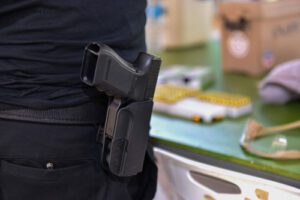 The District Court continued: In the current suit, Plaintiffs seek to enjoin the law’s enforcement of the following enumerated “sensitive places” set forth in Section 7(a): (1) Subpart 12 (prohibiting firearms in “a publicly owned or leased library or museum”); (2) Subpart 15 (prohibiting firearms in “a bar or restaurant where alcohol is served, and any other site or facility where alcohol is sold for consumption on the premises”); (3) Subpart 17 (prohibiting firearms in “a privately or publicly owned and operated entertainment facility within this State, including but not limited to a theater, stadium, museum, arena, racetrack or other place where performances, concerts, exhibits, games or contests are held”); and (4) Subpart 24 (prohibiting firearms in “private property, including but not limited to residential, commercial, industrial, agricultural, institutional or undeveloped property, unless the owner has provided express consent or has posted a sign indicating that it is permissible to carry on the premises a concealed handgun with a valid and lawfully issued permit under N.J.S.2C:58-4, provided that nothing in this paragraph shall be construed to affect the authority to keep or carry a firearm established under subsection e. of N.J.S.2C:39-6”). 2022 N.J. Laws c. 131.
The District Court continued: In the current suit, Plaintiffs seek to enjoin the law’s enforcement of the following enumerated “sensitive places” set forth in Section 7(a): (1) Subpart 12 (prohibiting firearms in “a publicly owned or leased library or museum”); (2) Subpart 15 (prohibiting firearms in “a bar or restaurant where alcohol is served, and any other site or facility where alcohol is sold for consumption on the premises”); (3) Subpart 17 (prohibiting firearms in “a privately or publicly owned and operated entertainment facility within this State, including but not limited to a theater, stadium, museum, arena, racetrack or other place where performances, concerts, exhibits, games or contests are held”); and (4) Subpart 24 (prohibiting firearms in “private property, including but not limited to residential, commercial, industrial, agricultural, institutional or undeveloped property, unless the owner has provided express consent or has posted a sign indicating that it is permissible to carry on the premises a concealed handgun with a valid and lawfully issued permit under N.J.S.2C:58-4, provided that nothing in this paragraph shall be construed to affect the authority to keep or carry a firearm established under subsection e. of N.J.S.2C:39-6”). 2022 N.J. Laws c. 131.
In addition, Section 7(b) of the legislation imposes an additional “sensitive place” restriction that bans functional firearms in vehicles, more specifically, it makes it a fourth-degree offense to transport or carry a firearm “while in a vehicle in New Jersey, unless the firearm is unloaded and contained in a closed and securely fastened case, gunbox, or locked unloaded in the trunk of the vehicle.” Id. The maximum sentence for this crime is 18 months’ imprisonment. See N.J.S.A. 2C:43-6(a)(4), 2C:44-1(f)(1)(e). Plaintiffs highlight the unconstitutional effect of Section 7(b): that permitted firearm carriers such as themselves now must transport a firearm in a vehicle the same way as someone who does not have a concealed carry permit from the State. [Pls.’ Br. at 8 (citing N.J.S.A. 2C:39-6(g)).]
The preceding paragraphs demonstrate how this legislation stood little chance of surviving a constitutional challenge. The authors were clearly opposed to the Bruen decision and sought to undermine it by declaring most of a New Jersey a “sensitive place” wherein permits to carry did not apply. The State of New York unsuccessfully attempted to declare all of Manhattan as a “sensitive place” in the Bruen case.
